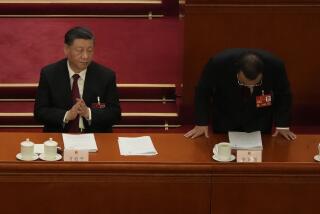After the Death of Chinese Leaders, Heirs Find They’re History as Well
- Share via
The world is soon to witness one of the most startling contrasts in the domain of politics--between the American and the Chinese ways of dealing with the death of a leader.
In the United States, political leaders often wield greater symbolic power and influence after death than during their lives. While living, John F. Kennedy was a dynamic but often ineffective and unsuccessful President. In death, his goals and spirit dominated American political life for more than a generation.
The same may be said in some ways of Dr. Martin Luther King Jr. and Richard Nixon--and even for lesser figures such as political strategist Lee Atwater and political activist Allard Lowenstein--all of whom came to be more honored posthumously than they were while on the job. To Americans, this seems only natural: In politics, we are sentimental about death.
So too in the years after the death of an American leader, family members and close aides are treated with the utmost respect, accorded high status and, in some cases, elevated to new positions of power. Generations of Kennedys, siblings and children, are elected to high office. Jesse Jackson becomes recognized for his own work rather than merely as one of King’s former aides.
China doesn’t work this way. It is, in fact, the opposite--a political culture remarkably unsentimental about death and its aftermath. In the years after a leader dies, his reputation tends to sag, not rise. His heirs lose their clout.
And that is the process we are all about to watch as the Little Big Man, Deng Xiaoping, who has dominated Chinese politics for the past two decades, nears his death.
Deng’s daughter, Deng Rong, has just toured this country promoting her new biography of her father. Before coming, she mentioned what is both obvious and, in China, unmentionable: the fact that her father, now 90, is in declining health and might some day die.
Take a good look at the recent pictures and interviews with Deng Rong and keep them in mind. For the past couple of years, she has wielded extraordinary influence in China. But five or 10 years from now, she probably will be hard to find. And so may the rest of Deng’s relatives and political heirs--including, quite possibly, his designated successor, Chinese President Jiang Zemin.
Deng Rong’s moment in the limelight calls to mind the series of interviews that Mao Tse-tung’s wife, Jiang Qing, gave to a U.S. researcher while she was at the peak of her political career in the early 1970s. The interviews, extraordinarily candid and personal by Chinese political standards, served only to increase the submerged resentment of her in Beijing. Within a month after Mao’s death, his wife found herself in jail, where she languished for the rest of her life.
And she was not the only one. In the years after Mao’s death, many of his other relatives, top aides and political heirs were unceremoniously dumped. That included, at the top of the political leadership, Chairman Hua Guofeng, whom Mao had promoted as his successor with the words, “With you in charge, I am at ease.” In death, Mao had a scant three years at ease before Hua was eased out of the leadership. Now Hua would be the perfect candidate to launch commercials for American Express cards in China: “Remember me?”
Throughout the early 1970s, one of the most famous people in China--both inside the country and in the United States--was Mao’s English-language translator, a young woman named Nancy Tang. In Beijing, she became a quietly powerful operator within Mao’s entourage. A decade later, while I was working as a correspondent in Beijing, Nancy Tang was being downgraded from an obscure editorial writer for an English-language newspaper to a still-more-obscure official for the foreign affairs office of China’s Ministry of Railroads.
What accounts for the differing Chinese and American treatment of death? One factor is built into the different political systems. The American system of checks and balances limits the power of a political leader, and our media coverage tends to be regularly critical, until death. In the American post-mortems, we try to compensate. The checks and balances are off. In China, it’s the reverse: There are no checks and balances in the system, and the press coverage of a political leader is relentlessly positive. It is only after death that his warts and purges may be displayed.
Some scholars who minimize the chances of political instability in China in the years after Deng are now arguing that China has changed considerably since 1976, when Mao died. China was poor back then, they note, and the circumstances of Mao’s death were unique. That is all true. Yet political leaders and factions can fight over the control of riches as much as they can fight over poverty or ideology.
Moreover, the underlying Chinese political dynamics--idealizing a single, great man as leader, and waging power struggles over the choice of the next leader--are not confined to the time of Mao’s death or to the People’s Republic. They can be found throughout Chinese history. “Basic to the Chinese approach to government is the principle that good government requires rule by superior people and not a rule of law,” writes MIT political scientist Lucian W. Pye. “This emphasis upon the personal character of the ruler has meant that Chinese politics tends to be a perpetual game of succession politics.”
In fact, the book tour by Deng’s daughter should serve as a reminder and warning of just how feudal Chinese politics remains.
Over the past couple of years, Deng’s children have wielded growing power, because they are supposed to be able to divine and interpret for 1.2 billion people the desires of a once-vibrant emperor, an emperor who is now deaf and perhaps unable to speak. You can imagine what sort of palace politics is involved here, what kinds of resentment the emperor’s children engender among others near the center of power.
The rest of the world, including America’s foreign-policy elite, plays a role in perpetuating China’s feudal political culture, because it accepts it, pays homage to it and seeks to profit from it.
Deng Rong was feted in New York City and Washington. Henry Kissinger gave her a breakfast. Rupert Murdoch--who insisted during the hassle over Newt Gingrich’s book that he doesn’t get involved in his company’s book ventures--showed up at the party that his publishing firm, HarperCollins, gave for Deng Rong. Murdoch, it may be noted, is interested in expanding his television operations into China. The book party was in Deng Rong’s suite on the top floor of the Waldorf-Astoria, the one next to the presidential suite.
Would John Major’s or Helmut Kohl’s kids get this sort of treatment?
If the past is any guide, those who now are courting the favor of Deng’s daughter may be making an unwise political bet. The week after she was quoted as acknowledging that her father was in declining health, the Chinese government bluntly contradicted her. “I can tell you that Mr. Deng Xiaoping is in good health,” declared a Chinese Foreign Ministry spokesman.
It was not a good sign, either for medical information in China or for the political prospects of the emperor’s children. In this country, a person like Deng Rong might run for high office after her father’s death. In China, her power, and that of Deng’s other heirs, may soon be history.
The International Outlook column appears here every other Monday.
More to Read
Get the L.A. Times Politics newsletter
Deeply reported insights into legislation, politics and policy from Sacramento, Washington and beyond. In your inbox twice per week.
You may occasionally receive promotional content from the Los Angeles Times.










